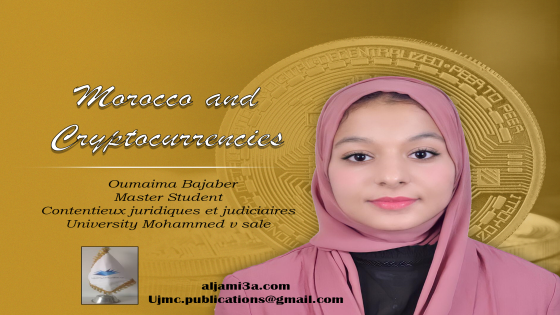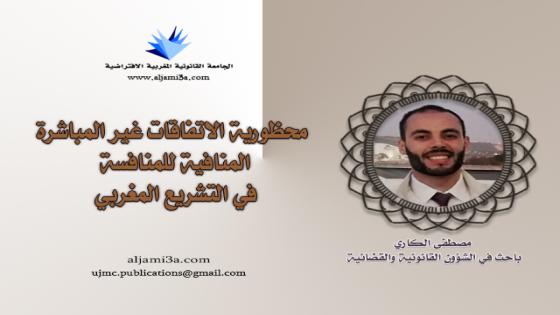Morocco and Cryptocurrencies
ملخص
تعد العملات الالكترونية من بين المستجدات التي لامست مجال المال والأعمال والتي أثرت في الظروف الاقتصادية والاجتماعية ولا يمكننا أن ننكر أن كل تقدم علمي أو تكنولوجي تظهر معه مزايا جديدة تحمل في طياتها بعض المخاطر
فلقد كان الحديث عن العملات الافتراضية ضربا من ضروب الخيال. وربما كان مجرد التفكير في ذلك يدفع للسخرية والاستغراب، ومع كل هذا التقدم التكنولوجي الملحوظ، استعرض المغرب موقفه تجاه هذه الثروة الرقمية من خلال بلاغ صدر عن مكتب الصرف وكان محتواه أن التعاملات الرقمية تشكل مخالفة لقانون الصرف الجاري به العمل ويعرض مرتكبيها للعقوبات والغرامات وذلك خشية على الاقتصاد والعملة الوطنية المغربية فكيف يعقل أن يكون هناك تجريم في غياب نص تشريعي صريح بخصوص هذه المسألة؟
ولأن الواقع يفرض نفسه، الآن وبعد مرور خمس سنوات على هذا المنع يبدو أن السلطات المغربية وعلى رأسها بنك المغرب بدأ يتراجع ضمنيا عن قراره، ويتأتى لنا ذلك من خلال إحداث لجنة خاصة لدراسة موضوع العملة الرقمية والتي ينحصر دورها بشكل أساسي في تحديد وتحليل الإيجابيات والسلبيات المترتبة عن “العملة الرقمية للبنك المركزي” بالنسبة للاقتصاد الوطني.
فما هي الايجابيات والسلبيات التي تحملها العملات الرقمية؟ وهل كان لها دور مهم خاصة وفي ظل أزمة كورونا؟ وما هي دوافع المغاربة لاستعمال هذه العملات وسبب التراجع سنة 2021 عن قرار المنع الصادر سنة 2017؟
كل هذه النقاط سنسلط عليها الضوء في مقالنا هذا،
” فإن وفقني الله قلت إن شاء الله أجران: أجر الاجتهاد وأجر الصواب. وإن أخطأت فحسبي أجر الاجتهاد وشرف المحاولة….”
قراءة ممتعة …
Introduction:
Although cryptocurrency has been attracting much attention, especially in contemporary times, its relevance does not necessarily stem from the robustness of its technology but rather from an increasing human need for a trustless system that manages human interactions.
the invention of the blockchain, that is, the underlying cryptocurrency technology, seems to be a direct consequence of the 2008 financial crisis.[1]However, its emergence can be regarded as a historical necessity, which is fueled by the advent of the Internet, and it has been growing since the world chose a fiat currency system in 1971 when the U.S. dollar has become untethered to gold. Since then, the U.S. dollar value has been decoupled from gold, and it has been floating on its own without any anchor to its value.
Cryptocurrency is a digital payment system that doesn’t rely on banks to verify transactions. It’s a peer-to-peer system that can enable anyone anywhere to send and receive payments. Instead of being physical money carried around and exchanged in the real world, cryptocurrency payments exist purely as digital entries to an online database describing specific transactions. When you transfer cryptocurrency funds, the transactions are recorded in a public ledger. Cryptocurrency is stored in digital wallets. And Bitcoin and most other cryptocurrencies are supported by a technology known as blockchain[2], which maintains a tamper-resistant record of transactions and keeps track of who owns what. Public blockchains are usually decentralized, which means they operate without a central authority such as a bank or government.[3]
The Digital currency created by the private sector, such as bitcoin, is designed to have a determined supply and enable payments with the premise of competing with and supplanting central bank fiat money and the banking system. Central banks are developing fiat public digital currency and banks are innovating in response.
A globally used private digital currency acts similar to a traditional hard currency within developing countries by eliminating fiat inflation but exacerbating bank fragility.
After this simple introduction about how digital currency come and why it was designed, we will try through this article to answer some important questions:
- What are the downsides and cons of this treatment?
- do these currencies carry with them positives, especially in Covid 19 period?
- Is Bitcoin Legal In Morocco?
- what is the Moroccan rush of using cryptocurrencies?
- How are Moroccans bypassing anti-crypto laws?
1: the downsides and cons of this treatment:
Recently, cryptocurrencies have become the main topic in the financial industry. But this cannot negate the existence of many negatives.
We start with some of the downsides: Firstly, Strong volatility – almost all of the ups and downs of thBTC value depend directly on the declared statements of the governments of different countries. Secondly, Large risks of investing in cryptocurrency should be considered in the medium and long term.
About disadvantages are much longer, and are related to the risk of money laundry, terrorist and another illegal activity financing, lack of a central issuer, which means that there is no legal formal entity to guaranty in case of any bankruptcy, and alike. However, although it is very difficult to predict, many academics and professionals of this topic claim that the future of cryptocurrencies is bright since they will remove trade barriers and intermediaries, it would decrease the cost of transactions, and therefore boost the trade and the economy. Nevertheless, we should consider pessimistic voices in the academic world as well, suggesting that the high risk of volatility, hacking risks, and lack of institutional backup makes the future of cryptocurrencies not very optimistic.[4]
After these negatives, do these currencies carry with them positives, especially in Covid 19 period?
2: Covid 19 and cryptocurrencies
Undoubtedly Moroccans are open to cryptocurrency, with peer-to-peer Bitcoin trading volumes increasing steadily over the years and reaching record highs of 2.18 million Moroccan Dirham in 2020.[5]As many Western societies are going paperless and cashless, several central banks across the world started testing digital money to assess the risks and benefits of cryptocurrency, a global market spurred by Covid-19 restrictions in emerging economies, particularly in Africa and Asia.
Unhinged by the COVID-induced economic crisis, cryptocurrency ownership in Morocco reached all-time high levels in 2020, reaching $2.18 million.[6]
Although Morocco’s ban on cryptocurrency, Bitcoin purchasing is soaring in the country, and the trading reach record-high levels on Local Bitcoins, (it’s a trading platform), in February 2021.
3: The legality of digital currencies in Morocco
We try to compare between the past and the present, The Morocco’s Exchange Office, the country’s foreign exchange watchdog, banned trading in cryptocurrencies in 2017, regarding them with skepticism. And to argue this, the point is the country is not ready to adopt these payment and exchange mechanisms which are not controllable. And so, the authorities fear that these means will be used for illicit purposes. They have a bad perception of this cryptocurrency and therefore the easiest way for them is to ban it. However, Bank Al-Maghrib had indicated in 2020 the constitution of a committee in charge ofmanaging a digital currency project of deliberating the economic benefits of adopting cryptocurrencies. [7]
Morocco’s position here is very contrary to what was reported in 2017 Because The central bank of Morocco has reportedly set up a committee to explore the merits and the risks of a digital dirham. The exploratory committee will also study Bitcoin and other digital currencies which are still banned by the Moroccan government.
Bank Al-Maghrib (BAM) seems to be gradually changing its stance on digital currencies, local outlet Morocco World News reports. It has charged the new committee with identifying and analyzing the advantages and drawbacks of a digital dirham for the Moroccan economy. BAM further confirmed the committee’s existence to Ledger Insights, clarifying that it was still at a very early stage.
In addition, this committee will thoroughly review all consequences of a CBDC on monetary policy, the structure of banking intermediation, financial stability, and legal framework.”
Regarding the need for a legal framework regulating dealing with cryptocurrencies, the ministry is working with the Central Bank and international partners, to study the feasibility of legalization [8]
After this, I think the future of cryptocurrency in Morocco seems to be bright given the data shown in a lot of studies. Also, Morocco is a dynamic country and Moroccans are finding ways to form cryptocurrency communities on the web where they share knowledge and help one another. For example, Facebook groups, YouTube channels, websites …
4: the Moroccan rush of using cryptocurrencies
there is a rush to use cryptocurrency in Morocco, as elsewhere, it is for several reasons. “Cryptocurrency seduces a good number of Moroccans, especially young people. For them, it is a way to consume services on the internet easily. So, they can buy sell, exchange, make investments to improve their financial situation … especially since this mechanism is accepted in many countries.[9]
5 Moroccans bypassing anti-crypto laws:
There are many ways for Moroccan people like Using peer-to-peer crypto marketplaces like LocalBitcoin, which allow users to buy BTC from other people online using cash.
Hopping the border (either physically or with a VPN) and buying in a country where it’s legal. Some major crypto exchanges, like Binance, allow users to exchange Moroccan dirham to cryptocurrency, but not vice versa.[10]
Conclusion:
Last but not least I think that Morocco fears for its economy and its local currency, as a result of the exit of foreign exchange through the virtual currency trade, which may at some stage reduce the foreign exchange supply, and even with the current ban, local reports suggest that the digital currency industry in Morocco remains very much alive.
References:
Articles:
- The status of cryptocurrency in Morocco, Faculty of Languages, Letters and Arts, IbnTofail University, Kenitra, Morocco
- In a few words, a blockchain is a digital ever-growing list of data records. Such a list is comprised of many blocks of data, which are organized in chronological order and are linked and secured by cryptographic proofs.
Links:
- https://academy.binance.com/en/glossary/blockchain?utm_campaign=googleadsxacademy&utm_source=googleadwords_int&utm_medium=cpc&gclid=CjwKCAiApfeQBhAUEiwA7K_UH70c7Dy3ixZwk10WpolwOWa0Z6tABQQ514YKCazO4VWQXwe-xC-vsBoC3YQQAvD_BwE
- https://www.nerdwallet.com/article/investing/cryptocurrency “CRYPTOCURRENCIES – ADVANTAGES AND DISADVANTAGES journal of economics “
- https://triple-a.io/crypto-ownership-morocco/Crypto currency information about Morocco
- (Morocco Leads North Africa in Bitcoin Trading JihaneRahhouJan. https://www.moroccoworldnews.com/2022/01/346436/morocco-leads-north-africa-in-bitcoin-trading)
- Morocco Studies Licensing Digital Currencies https://www.bnreport.com/en/licensing-digital-currencies/?amp
- https://www.bnreport.com/en/licensing-digital-currencies/?amp ”Morocco Studies Licensing Digital Currencies”
- https://thehustle.co/03292021-morocco-cryptocurrency/amp/)
[1] The status of cryptocurrency in Morocco, Faculty of Languages, Letters and Arts, IbnTofail University, Kenitra, Morocco
[2] In a few words, a blockchain is a digital ever-growing list of data records. Such a list is comprised of many blocks of data, which are organized in chronological order and are linked and secured by cryptographic proofs.
[3] https://www.nerdwallet.com/article/investing/cryptocurrency
[4]CRYPTOCURRENCIES – ADVANTAGES AND DISADVANTAGES journal of economics
[5] https://triple-a.io/crypto-ownership-morocco/Crypto currency information about Morocco
[6] (Morocco Leads North Africa in Bitcoin Trading JihaneRahhouJan. https://www.moroccoworldnews.com/2022/01/346436/morocco-leads-north-africa-in-bitcoin-trading)
[7] (Morocco Leads North Africa in Bitcoin Trading JihaneRahhouJan.
[9]https://www.bnreport.com/en/licensing-digital-currencies/?amp
”Morocco Studies Licensing Digital Currencies”
[10]https://thehustle.co/03292021-morocco-cryptocurrency/amp/)













